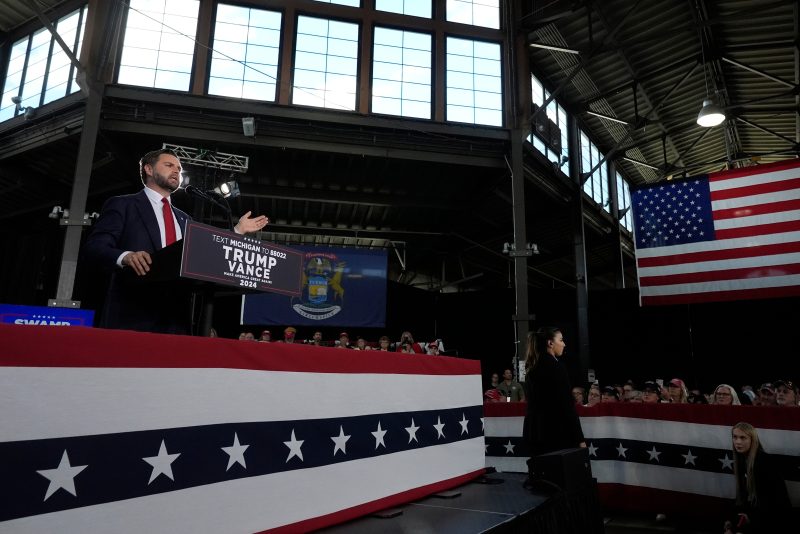DETROIT — Sen. JD Vance’s event here chugged along like a typical campaign rally. He attacked his rivals, painted a grave picture of life under the Democratic Party and warned Republicans against complacency. Members of the audience nodded, clapped and cheered.
Then an aide handed a microphone to journalists. And things got raucous.
A Detroit Free Press reporter was booed as she identified herself and her employer ahead of a question about protesting the November election outcome. A student journalist was similarly heckled for asking Vance about how he would ensure safety from gun violence on college campuses. A Black reporter asked why Black voters in Michigan should cast their ballots for Donald Trump, and the mostly White crowd shouted back answers. The audience’s attention bounced back and forth from Vance’s podium to the media risers as if watching a tennis match, with many offering mostly negative feedback to the reporters.
The unusual scene has become a signature feature of Vance’s campaign stops in a race in which the two sides have accused each other of hiding from the press and the public. The strategy has put the Republican vice-presidential nominee, who was largely unknown to the public before his national run, at center stage. Politicians don’t usually hold news conferences in front of crowds of their fans, but on the trail with Vance, the traditional question-and-answer session with journalists — a staple of democracies — morphs into campaign theater.
The questioning in public, which has been a feature of most of Vance’s campaign events in recent weeks, offers Republicans an opportunity to highlight the much lighter media engagement of his Democratic opponent, Minnesota Gov. Tim Walz. It’s also where Vance often makes news, recently calling a $500 million federal grant for a Michigan electric vehicle plant “table scraps” and proposing an overhaul of the Affordable Care Act’s insurance markets for chronically ill patients. The tactic has allowed Vance to put his and Trump’s opinions on the record about some of the issues that are most important to voters — and it offers his supporters a chance to see him vigorously defending their concerns.
The back-and-forth between the candidate and reporters animates the audience, which rarely sees this type of interaction up close. The performance often generates the crowds’ most vocal reactions, causing some of those facing Vance to pivot toward the back, where reporters are stationed.
Vance, who was once a combat correspondent in the U.S. military and then a media-friendly senator, mostly smiles when the crowds jeer and has characterized their reactions as an exercise of their free speech rights. He has also at times criticized the media, complaining at a recent stop in Charlotte about the number of questions he got about embattled North Carolina Lt. Gov. Mark Robinson (R). Robinson has a long record of inflammatory comments made in full public view.
“I really cannot believe that the American media is so much more focused on this than the struggles of their fellow citizens,” Vance said to cheers from the crowd.
More infrequently, Vance has vouched for a reporter or a question he appreciated. In Phoenix, members of the crowd jeered when CNN producer Kit Maher introduced herself. Vance cut them off.
“Kit is one of the good ones, but she won’t be able to go back to CNN after I just said that,” Vance said, before the reporter asked how a Trump administration could prevent school shootings.
A reporter with the Traverse City Record-Eagle got heckled before he could even ask his question when Vance visited Northern Michigan. But once he was able to ask about how the GOP ticket would make housing affordable, Vance acknowledged the question’s credibility.
“We’re having fun,” he said. “You’re allowed to ask your question. They’re allowed to tell you how they think about it. That’s okay. This is America.”
Vance offered a similar take Tuesday in Detroit when a reporter was jeered for asking what evidence he had to accuse the Biden administration of misappropriating hurricane relief funds. Vance promised that his crowds, while vocal, were not violent: “The First Amendment goes in both directions … not a single person here is going to harm you. They’re just going to speak their minds.”
Standing toward the back of the venue where Vance spoke in Traverse City, Michael and Judy Smith were stunned when he concluded his remarks by inviting questions from the media. The Trump supporters had not seen a candidate interact with a reporter before, and they expressed appreciation that Vance was able to hold forth on various issues, including housing and debate plans.
“He has guts,” said Michael, noting that he had previously held some reservations about Trump’s running-mate selection.
In Detroit, Trump supporter Jackie Barton recorded a video on her phone of reporters asking questions and Vance’s responses, interspersed with her own heckling.
“Climate change is bulls—,” the 62-year-old shouted when a reporter asked Vance how he could appeal to voters who worry about the environmental consequences of manufacturing more gas-powered cars. But Barton carefully listened to and appreciated Vance’s response blaming China and India for greater carbon emissions. The campaign volunteer said she will repeat Vance’s answers when she faces similar questions.
“Knowing this information helps me to be able to say, hey, listen, I heard it coming right out of his mouth,” she said. “This was so awesome to be able to really hear something and not have it mixed up and whitewashed.”
